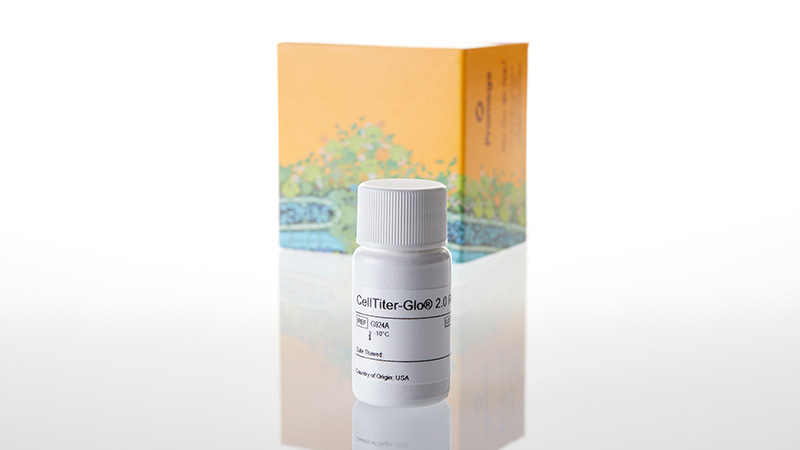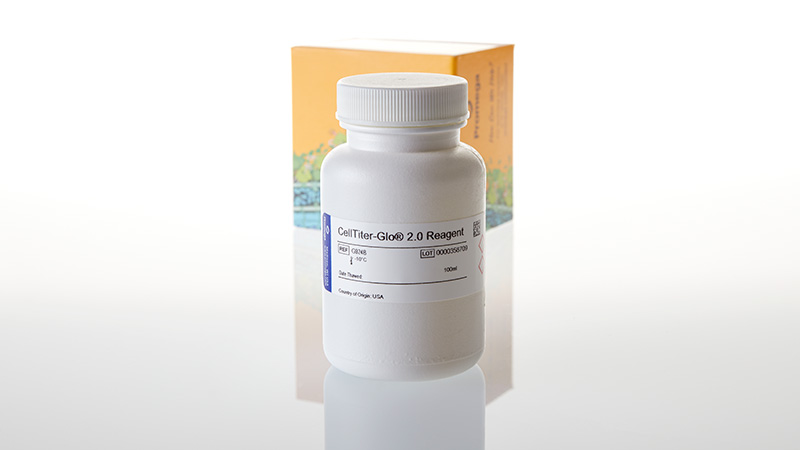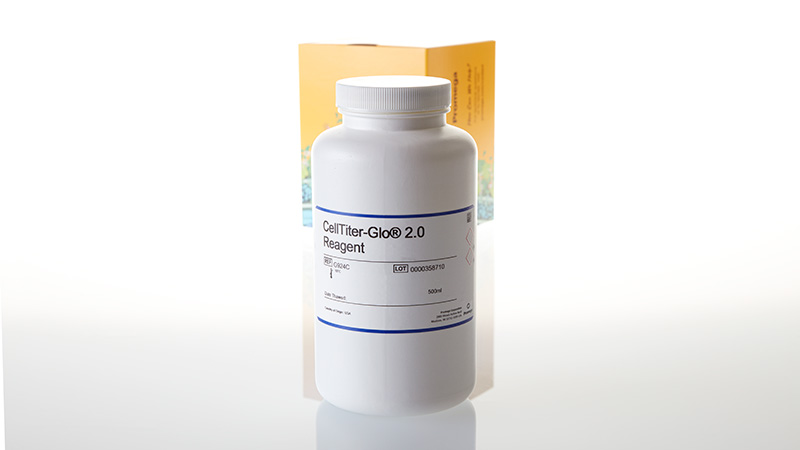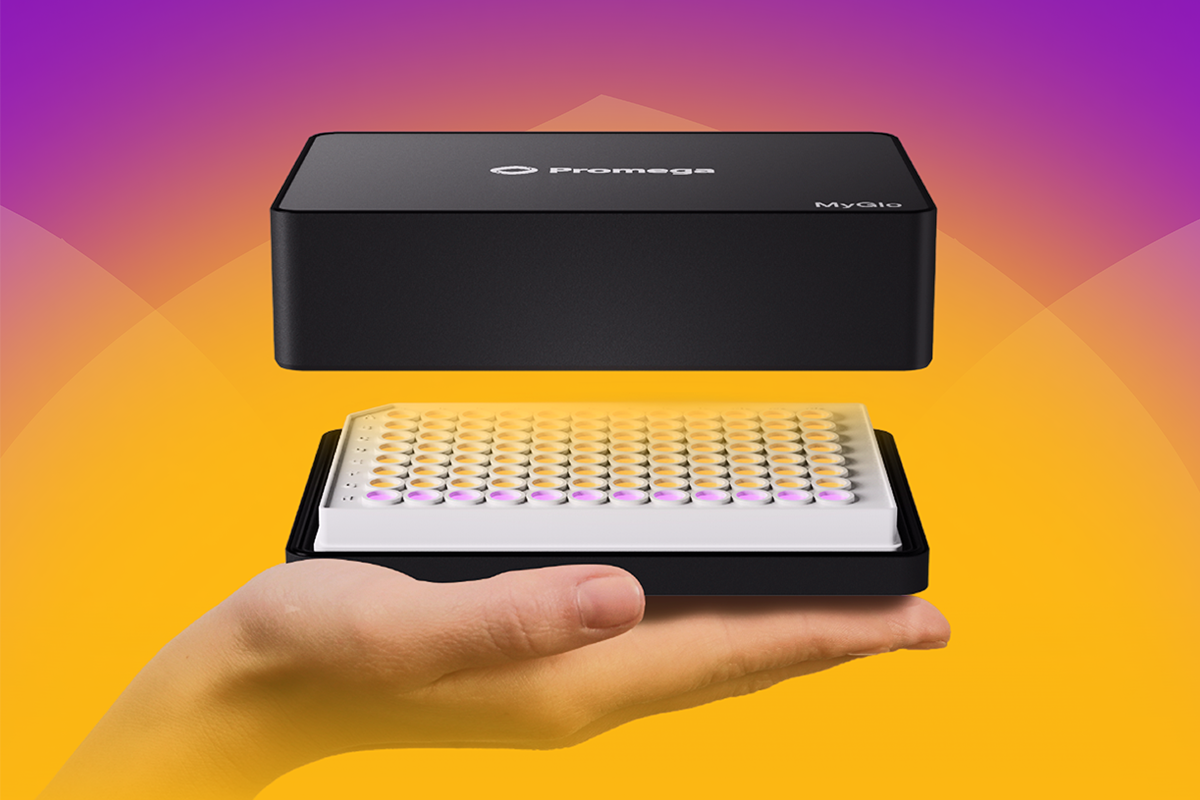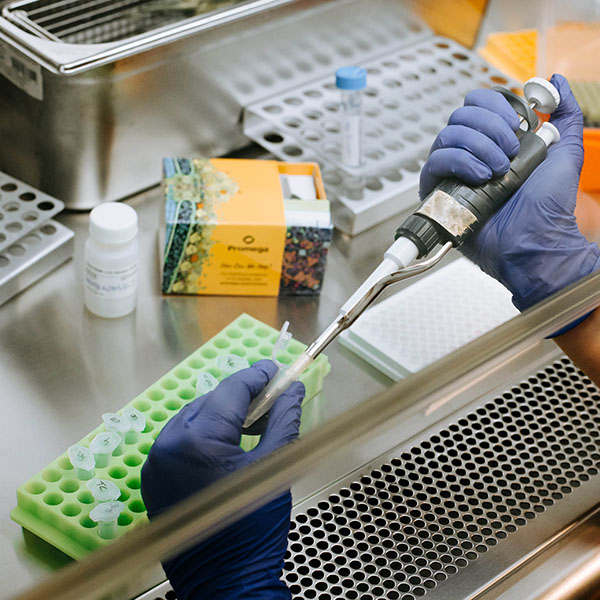CellTiter-Glo® 2.0 Cell Viability Assay
A Luminescent Cell Viability Assay for Fast, Easy, Everyday Use
- ATP assay for detection of viable cells
- Reduced preparation time and convenient repeat use over multiple days
- Same great performance as classic CellTiter-Glo® Cell Viability Assay
- Integrates with the MyGlo® Reagent Reader
Catalog Number:
Choose a product
Size
Catalog Number: G9241
Catalog Number: G9242
Catalog Number: G9243
Catalog Number: MG1010

CellTiter-Glo® 2.0 Measures ATP, a Key Indicator of Cell Health
CellTiter-Glo® 2.0, based on the original CellTiter-Glo® Cell Viability Assay chemistry, is a single-reagent assay with improved stability for convenient storage and simpler setup. Whether you perform cell proliferation assays in a single plate or process hundreds of plates at a time, the ready-to-use reagent is designed for fast and easy everyday use. A highly sensitive ATP assay with broad linearity, it is amenable to high- throughput screening and multiplex applications.
The CellTiter-Glo® 2.0 Assay determines the number of viable cells in culture by quantifying ATP, which indicates the presence of metabolically active cells. Luminescence readout is directly proportional to the number of viable cells in culture.
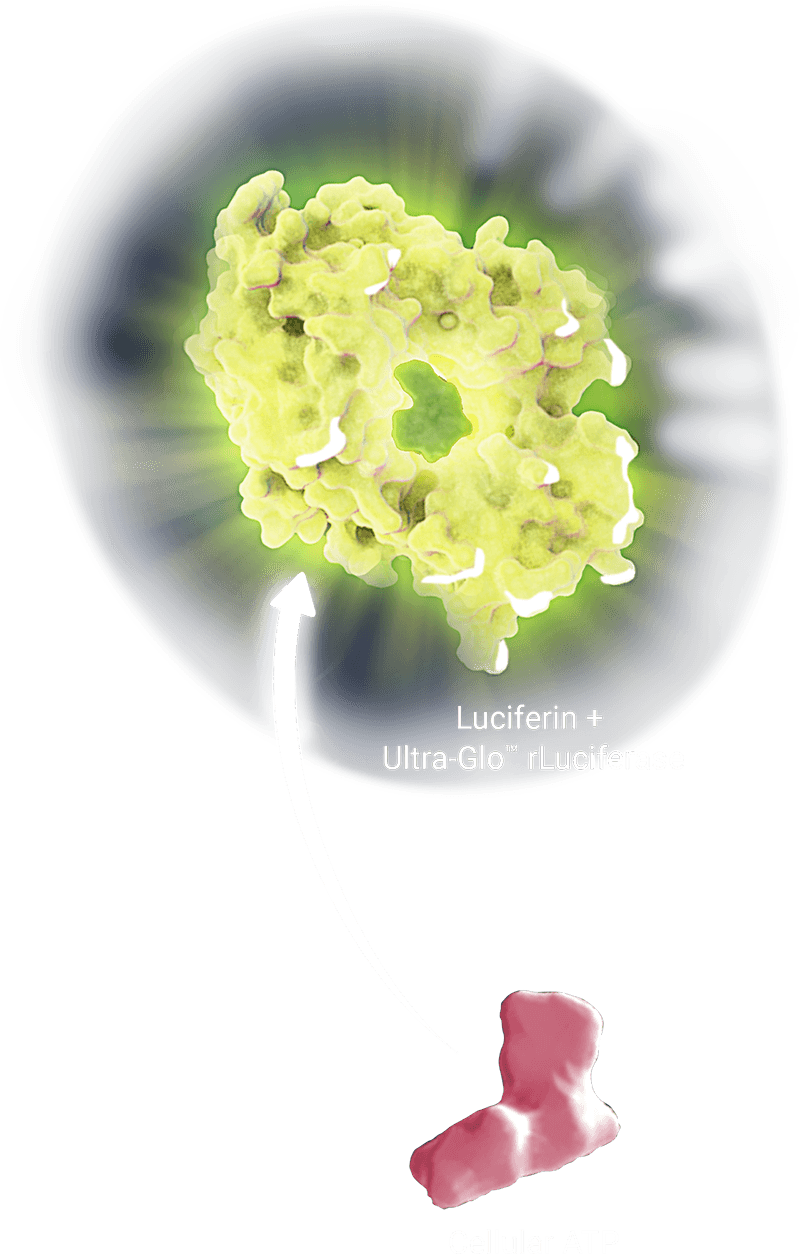
Simple Assay Setup and Enhanced Stability
A single, ready-to-use reagent and simple "add-mix-measure" protocol mean there's no need to mix components.
The CellTiter-Glo® 2.0 reagent is stable at room temperature and at 4°C, allowing fast and easy assay implementation, and eliminating the thawing and mixing required with other ATP assays. Enhanced stability also allows convenient storage.
| Percent Activity Remaining | CellTiter-Glo® 2.0 Reagent Stability | CellTiter-Glo® "Original" Reagent Stability |
|---|---|---|
| >85% Activity at 22°C | 7 days | 12 hours |
| >85% Activity at 4°C | 2 months | 3.5 days |
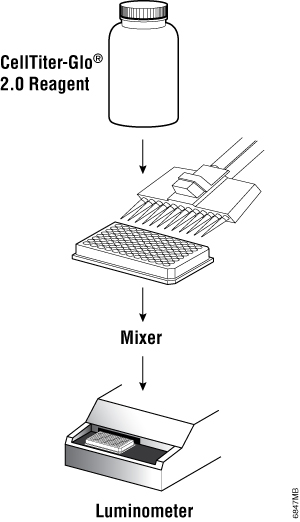
Assay Performance
The CellTiter-Glo® 2.0 Cell Viability Assay exhibits the same high performance as the classic CellTiter-Glo® Assay, making it suitable for use from benchtop scale to high-throughput screening.



High sensitivity and broad linearity. Luminescence measured with the CellTiter-Glo® 2.0 Assay is proportional to the number of viable Jurkat cells in culture over three orders of magnitude in 96-well, 384-well and 1536-well plates.

High sensitivity of the assay system enables reliable performance even from low cell densities. Jurkat cells were seeded in all-white 96-well plates at 400, 2,000 and 10,000 cells/well and were treated with Bortezomib for 20 hours. Viability was measured with CellTiter-Glo® 2.0 and MyGlo® Reagent Reader
Multiplex With Other Cell Viability or Cytotoxicity Assays
CellTiter-Glo® 2.0 cell viability assay can be multiplexed with other assays, reducing cell culture costs and labor. Multiplexing assays in the same sample well allows complementary measures of cell health to correct for errors in culturing, plating or assay chemistry interferences.
In the example shown here, CellTox™ Green cytotoxicity assay reagent was added to bortezomib-treated K562 cells after 48 hours of exposure. Fluorescence associated with cytotoxicity was measured. The CellTiter-Glo® 2.0 assay reagent was added and luminescence measured as an indicator of cell proliferation.

Case Study
Automated Assay Workflow for Mitochondrial Dysfunction
Challenge:
Louise Young, a research fellow at the University of Strathclyde, studies mitochondria’s role in Alzheimer’s and cancer. Her team needed a reliable, reproducible method to measure ROS output while screening compounds to decrease ROS levels. Traditional assays had wash steps, causing variability.
Result:
Using ROS-Glo™ H2O2 Assay, the team achieved faster turnaround with a no-wash protocol, greater reproducibility through luminescent readout and improved efficiency for quicker data collection.
Their workflow also includes RealTime-Glo™ Annexin V Assay for apoptosis/necrosis and CellTiter-Glo® 2.0 Assay for cell viability. Several compounds successfully reduced ROS, guiding future research into their protein targets.

Bioluminescence Resource Center
Learn more about how luminescence works, what makes it different from fluorescence and how you can use luminescence to fuel your own research.
Protocols
Specifications
Catalog Number:
What's in the box?
| Item | Part # | Size |
|---|---|---|
CellTiter-Glo® 2.0 Reagent |
G924A | 1 × 10ml |
SDS
Search for SDSCertificate of Analysis
Use Restrictions
For Research Use Only. Not for Use in Diagnostic Procedures.Storage Conditions
What's in the box?
| Item | Part # | Size |
|---|---|---|
CellTiter-Glo® 2.0 Reagent |
G924B | 1 × 100ml |
SDS
Search for SDSCertificate of Analysis
Use Restrictions
For Research Use Only. Not for Use in Diagnostic Procedures.Storage Conditions
What's in the box?
| Item | Part # | Size |
|---|---|---|
CellTiter-Glo® 2.0 Reagent |
G924C | 1 × 500ml |
SDS
Search for SDSCertificate of Analysis
Use Restrictions
For Research Use Only. Not for Use in Diagnostic Procedures.Storage Conditions
What's in the box?
| Item | Part # | Size | Available Separately |
|---|---|---|---|
MyGlo™ Reagent Reader
|
MG1000 | 1 × 1 each | |
CellTiter-Glo® 2.0 Reagent |
G9241 | 1 × 10ml | View Product |
SDS
Search for SDSCertificate of Analysis
Use Restrictions
For Research Use Only. Not for Use in Diagnostic Procedures.Storage Conditions
See Protocol for detailed storage recommendations.Resources
Articles
Citations
-
Effective photo-enhancement of cellular activity of fluorophore-octaarginine antisense PNA conjugates correlates with singlet oxygen formation, endosomal escape and chromophore lipophilicity.
2018
Sci. Rep.
-- -
Traditional and systems biology based drug discovery for the rare tumor syndrome neurofibromatosis type 2.
2018
PLos ONE
-- -
Sensitivity and engineered resistance of myeloid leukemia cells to BRD9 inhibition.
2016
Nat Chem. Biol.
-- -
The cellular stress proteins CHCHD10 and MNRR1 (CHCHD2): Partners in mitochondrial and nuclear function and dysfunction
2018
J. Biol. Chem.
-- -
NRF2 Regulates HER1 Signaling Pathway to Modulate the Sensitivity of Ovarian Cancer Cells to Lapatinib and Erlotinib.
2017
Oxid. Med. Cell Longev.
-- -
Gas6-Axl signaling in presence of Sunitinib is enhanced, diversified and sustained in renal tumor cells, resulting in tumor-progressive advantages.
2017
Exp. Cell Res.
-- -
Glutamine drives glutathione synthesis and contributes to radiation sensitivity of A549 and H460 lung cancer cell lines.
2016
Biochim. Biophys. Acta
-- -
Imaging oxygen in neural cell and tissue models by means of anionic cell-permeable phosphorescent nanoparticles.
2015
Cell Molec. Life Sci.
-- -
Development and validation of a luminescence-base, medium throughput assay for drug screening in Schistosoma mansoni.
2015
PLOS Negl. Trop. Dis.
-- -
In vitro ischemia decreases histone H4K16 acetylation in neural cells.
2015
FEBS Lett.
-- -
DUX4-induced dsRNA and MYC mRNA stabilization activate apoptotic pathways in human cell models of facioscapulohumeral dystrophy.
2018
PLoS Genet.
-- -
miR-195 targets cyclin D3 and survivin to modulate the tumorigenesis of non-small cell lung cancer.
2018
Cell Death Dis.
-- -
Glucose starvation induces LKB1-AMPK-mediated MMP-9 expression in cancer cells.
2018
Sci. Rep.
-- - See all citations
Related Products
Similar Products
CellTiter-Glo® 3D Cell Viability Assay
A homogeneous method optimized to assess viability in 3D cell culture.
G9681, G9682, G9683
RealTime-Glo™ MT Cell Viability Assay
A bioluminescent method to kinetically monitor viability in cell culture up to 72 hours.
G9711, G9712, G9713
CellTiter-Fluor™ Cell Viability Assay
A non-lytic, fluorescent cell viability assay with multiplex capability.
G6080, G6081, G6082
Lumit® hKi-67 Immunoassay for Cell Proliferation
Easy add-mix-measure plate-based assay for tracking Ki-67 without washing steps or specialized detection equipment.
CS3076A01
Frequently Used With
GloMax® Discover System
High-performance microplate reader for detecting luminescence, fluorescence and absorbance.
GM3000
CellTox™ Green Cytotoxicity Assay
Measures changes in membrane integrity. Kinetically monitors cytotoxicity up to 72 hours with multiplex capability.
G8741, G8742, G8743, G8731
RealTime-Glo™ Apoptosis and Necrosis Assay
A one-step, plate-based assay for continually monitoring apoptosis progression.
JA1011, JA1012, JA1000, JA1001
Caspase-Glo® 3/7 Assay System
An easy-to-use, plate-based luminescent assay for detecting caspase-3/7 activity.
G8090, G8091, G8093, G8092, MG1010
Product Citations
Recent publications that mention the use of this product.
